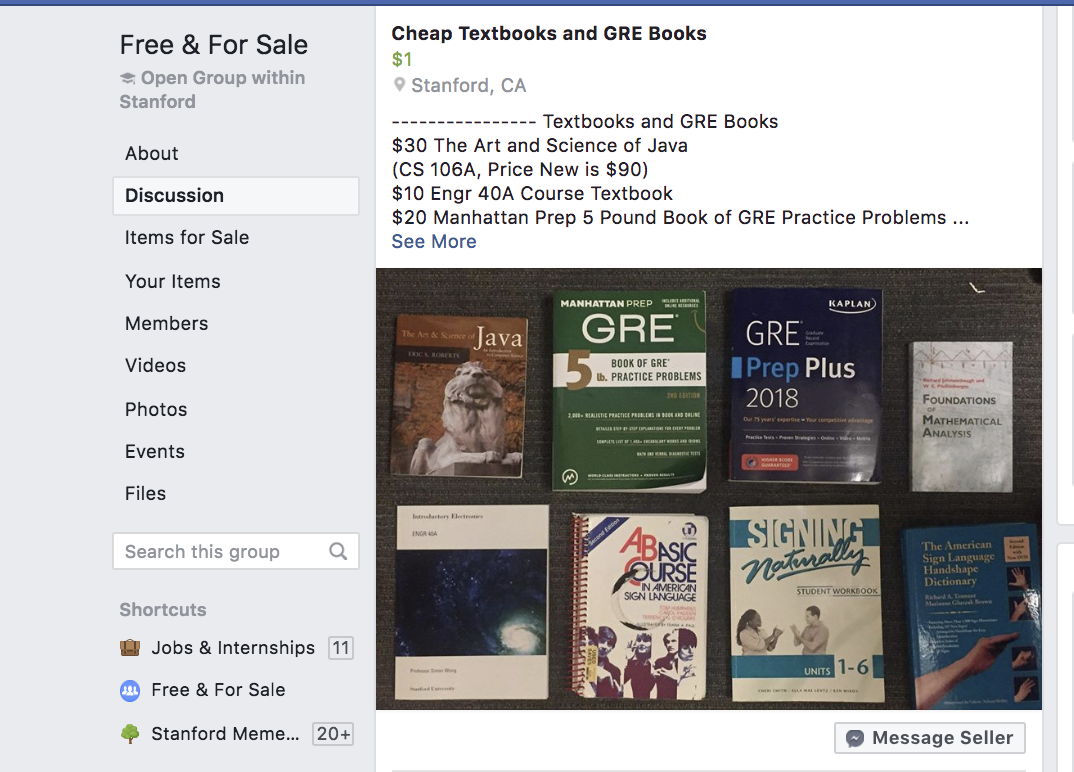The Facebook group “Free and For Sale” has been used by countless Stanford students as a platform to sell and buy secondhand goods. This year, it has continued to be a widely-used resource that helps students save time and money.
The group, which is open only to Stanford students, has nearly 12,000 users. Almost anything can be offered and sold in the group, ranging from appliances and apparel to photo-taking services and old textbooks. Prices are set by the seller, and buyers usually request items by privately messaging the seller or commenting on the post.
Sales have increased at the end of the school year as students begin to move out of their housing and search for a convenient forum to discard unwanted goods. The group is only used by Stanford students, so the goods are priced more reasonably and therefore benefit students looking for a financial boost, according to Leela Srinivasan ‘18.
Sellers in the group usually take into account the fact that the goods they are selling are almost entirely secondhand, and are aware that all buyers are on a college-student budget. Srinivasan usually sells items a few notches below their retail value.
“I usually sell clothes, and I definitely sell them for less than they’re valued because I know that if I sold them for as much as I bought them for, people wouldn’t buy them,” Srinivasan said.
Also, because all the sellers are college students, the selection of items is better tailored to the needs of college students, according to Kali Cornn ‘18.
“Because [sellers are] other Stanford students, they know what items other students would recommend, so you might find [an] item that you might not think you wanted or needed, but since another student has an item you actually want you’d think, ‘I actually need this product,’” said Cornn.
Cornn also emphasized the fact that the group can be a great resource for academic materials, a sister platform to the “Stanford Textbook Exchange” Facebook group.
“Textbooks are really expensive in the bookstore and if you can’t afford a textbook or you’re not sure if you’re going to stay in the class, it might be better to just buy a textbook used from someone else,” Cornn said.
In addition to the purchasing and selling of items, students like Srinivasan have also utilized the group to offer services and short favors in return for payment, offering opportunities for students to earn some quick money.
“I remember one time I needed a service and so I posted in the ‘Free & For Sale’ group because I knew that people are looking for a good deal,” Srinivasan said. “I got someone to do it, and it was great.”
The group is centralized on campus, making the exchanges easier as nearly all users live on or near campus.
“I think it’s convenient because most of the people who want to buy textbooks, which [is what] I usually sell, are on campus,” Cornn said. “It’s also a really easy way to communicate with people on Facebook rather than just using email, which can get lost.”
Another factor that attracts repeat buyers and sellers to the group is the reliability of the users. Srinivasan allows interested buyers to try clothes, which is helpful for buyers to ensure the quality of the items they are thinking of purchasing.
“I would assume with Stanford students, they care a bit about image,” Srinivasan said. “I think books and clothes are relatively trustworthy because you know what you’re getting.”
In the past, students have also used the group to help people who have lost their Stanford student identification cards. This became problematic when users realized that the numbers on ID cards could be used to enter dorm dining halls, but administrators of the group quickly resolved the problem.
“Some Stanford students messaged all of the admins and seemed really serious,” said Facebook group administrator Alex Wang ‘18. “[They were] like, ‘Hey, did you know this was happening?’ and ‘Could you do something about it?’”
The problem was quickly stemmed by covering the ID number, and because the group is so widely used, the group remains a more efficient alternative to asking around or reporting items to the lost and found.
Even as the current group administrators move on from Stanford, the group will remain a useful resource for future Stanford students.
“It’s a marketplace full of the sort of items that you would want as a student,” Wang said.
Contact Kristen Yee at kristen.yee00 ‘at’ gmail.com
